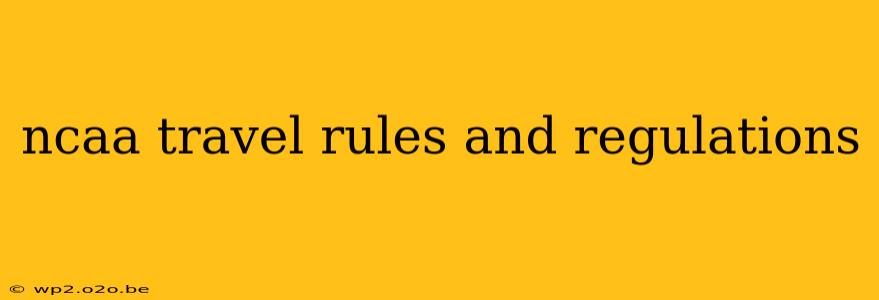Navigating the NCAA's complex travel rules and regulations can be challenging. This comprehensive guide breaks down the key aspects of NCAA travel policies, providing clarity for coaches, student-athletes, and administrators. Understanding these rules is crucial for maintaining compliance and ensuring a smooth travel experience for your team.
Understanding the NCAA's Approach to Travel
The NCAA's regulations surrounding travel are designed to ensure fairness, promote student-athlete well-being, and maintain institutional control. The rules aim to prevent recruiting violations and ensure that all teams operate within a similar financial framework. This means strict guidelines on who can pay for travel expenses, what constitutes permissible transportation, and what activities are allowed during travel.
Key Aspects of NCAA Travel Regulations
1. Permissible Expenses: What the NCAA Covers
The NCAA permits institutions to cover necessary expenses for team travel related to competition. These typically include:
- Transportation: This covers airfare, bus rentals, train tickets, and other reasonable modes of transportation directly related to competition. The choice of transportation often depends on factors like distance, cost, and team size.
- Lodging: The NCAA allows for reasonable lodging costs, including hotels and motels. The standard of lodging should reflect the institution's resources and the nature of the event.
- Meals: Expenses for meals are permissible, typically during travel days and while attending competitions. The rules specify what constitutes "reasonable" meal allowances.
- Game-related Expenses: This includes entry fees, officials' fees (if applicable), and other costs directly associated with participation in the competition.
2. Prohibited Expenses: What the NCAA Doesn't Cover
Several expenses are strictly prohibited under NCAA travel regulations. These include:
- Luxury Travel: First-class airfare, extravagant hotels, or other excessively luxurious accommodations are not permissible.
- Personal Expenses: Expenses unrelated to competition, such as sightseeing tours, entertainment, or personal shopping, are prohibited.
- Entertainment: Providing entertainment for recruits or student-athletes during travel is strictly forbidden.
- Unnecessary Expenses: Any expense deemed unnecessary or excessive in relation to the competition is prohibited.
3. Who Can Pay for Travel Expenses?
Only the institution, specifically its athletic department, is permitted to pay for team travel expenses. This means that booster clubs, individuals, or other outside entities cannot cover these costs. Any deviation from this rule can result in serious penalties.
4. Transportation Regulations: Getting There and Back
The NCAA allows for a variety of transportation methods, but they must be safe and reasonable. This includes:
- Chartered Buses: A common and often preferred method, especially for shorter distances.
- Commercial Air Travel: Airlines provide a convenient option for longer trips. Coaches must ensure compliance with regulations related to ticket purchases and seating arrangements.
- Team Vans/SUVs: Acceptable for shorter distances and with proper safety measures.
5. Pre-Competition and Post-Competition Activities
The NCAA carefully regulates activities during travel, particularly those involving recruits. Activities must be directly related to competition and cannot be used for recruiting purposes. Unsupervised activities are generally discouraged.
Maintaining Compliance: Best Practices for NCAA Travel
- Detailed Budgeting: Create a meticulous budget that outlines all expected expenses and adheres to NCAA guidelines.
- Documentation: Keep meticulous records of all travel expenses, receipts, and invoices. This documentation is essential for audits and demonstrates compliance.
- Training: Ensure coaches, student-athletes, and staff involved in travel are thoroughly trained on NCAA travel rules and regulations.
- Regular Audits: Conduct internal audits to identify any potential compliance issues before they escalate.
- Consult with Compliance Officers: Regular consultation with your institution's compliance officers is crucial to ensure that all travel arrangements are NCAA-compliant.
Failing to comply with NCAA travel regulations can lead to severe penalties, including fines, probation, and even the loss of eligibility for student-athletes. Strict adherence to these rules is paramount to maintain institutional integrity and ensure a successful and compliant athletic program. This guide offers a starting point for understanding the complexities of NCAA travel regulations, but it’s essential to consult the official NCAA manual and your institution's compliance office for the most up-to-date and precise information.

